

Stanley Kubrick. A Clockwork Orange (film) A Clockwork Orange is a 1971 British-American film written, produced, and directed by Stanley Kubrick, adapted from Anthony Burgess' 1962 novella A Clockwork Orange.
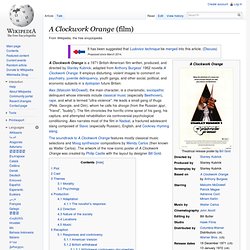
It employs disturbing, violent images to comment on psychiatry, juvenile delinquency, youth gangs, and other social, political, and economic subjects in a dystopian future Britain. The next day, while truant from school, Alex is approached by probation officer Mr. P. R. Deltoid, who is aware of Alex's violence and cautions him. 2001: A Space Odyssey (film) Produced and distributed by the U.S. studio Metro-Goldwyn-Mayer, the film was made almost entirely in England, using both the studio facilities of MGM's subsidiary "MGM British" (among the last movies to be shot there before its closure in 1970)[4] and those of Shepperton Studios, mostly because of the availability of much larger sound stages than in the United States.
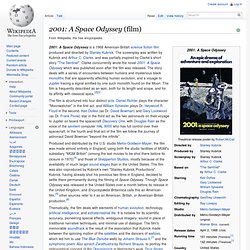
The film was also coproduced by Kubrick's own "Stanley Kubrick Productions". Kubrick, having already shot his previous two films in England, decided to settle there permanently during the filming of Space Odyssey. Though Space Odyssey was released in the United States over a month before its release in the United Kingdom, and Encyclopædia Britannica calls this an American film,[5] other sources refer to it as an American, British, or American-British production.[6] The film consists of four major sections, all of which, except the second, are introduced by superimposed titles.
A Pan Am space plane carries Dr. Dr. Strangelove. The story concerns an unhinged United States Air Force general who orders a first strike nuclear attack on the Soviet Union.
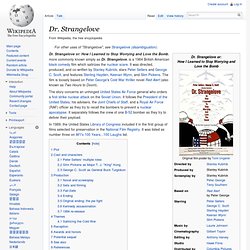
It follows the President of the United States, his advisers, the Joint Chiefs of Staff, and a Royal Air Force (RAF) officer as they try to recall the bombers to prevent a nuclear apocalypse. It separately follows the crew of one B-52 bomber as they try to deliver their payload. In 1989, the United States Library of Congress included it in the first group of films selected for preservation in the National Film Registry. It was listed as number three on AFI's 100 Years...100 Laughs list. Plot[edit] Lolita (1962 film) Eyes Wide Shut. Eyes Wide Shut is a 1999 drama film loosely based upon Arthur Schnitzler's 1926 novella Dream Story.
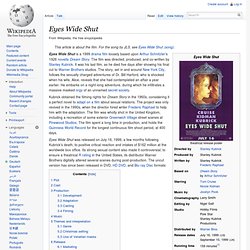
The film was directed, produced, and co-written by Stanley Kubrick. It was his last film, as he died five days after showing his final cut to Warner Brothers studios. Francis Ford Coppola. Francis Ford Coppola (/ˈkoʊpələ/; born April 7, 1939) is an American film director, producer and screenwriter.

He was part of the New Hollywood wave of filmmaking. He followed with The Godfather Part II in 1974, which became the first sequel to win the Academy Award for Best Picture. Highly regarded by critics, it brought him three more Academy Awards: Best Adapted Screenplay, Best Director and Best Picture, and made him the second director, after Billy Wilder, to be honored three times for the same film. Apocalypse Now. The film has been cited for the problems encountered while making it.
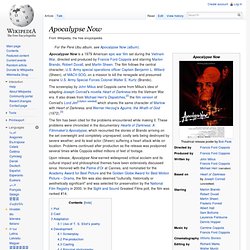
These problems were chronicled in the documentary Hearts of Darkness: A Filmmaker's Apocalypse, which recounted the stories of Brando arriving on the set overweight and completely unprepared; costly sets being destroyed by severe weather; and its lead actor (Sheen) suffering a heart attack while on location. Problems continued after production as the release was postponed several times while Coppola edited millions of feet of footage. The Godfather. Plot[edit] Shortly before Christmas 1945, drug baron Virgil "The Turk" Sollozzo, backed by the Corleones' rivals, the Tattaglias, asks Vito for investment in the emerging drug trade and protection through his political connections.
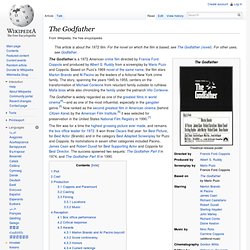
Vito disapproves of drug dealers, so he sends his enforcer, Luca Brasi, to spy on them. The family then receives two fish wrapped in Brasi's vest, imparting that he "sleeps with the fishes". An assassination attempt by Sollozzo's men lands Vito in the hospital, so his eldest son, Sonny, takes command. Sollozzo kidnaps Hagen to pressure Sonny to accept his deal. The Godfather Part II. A sequel, The Godfather Part III, was released 16 years later in 1990.
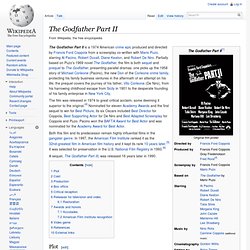
Plot[edit] In 1901 Corleone, Sicily, nine-year-old Vito Andolini’s family is killed after his father insults local Mafia chieftain Don Ciccio. He escapes to New York and is registered as "Vito Corleone" on Ellis Island. The Godfather Part III. Coppola and Puzo originally wanted the title to be The Death of Michael Corleone but this was not acceptable to Paramount Pictures.
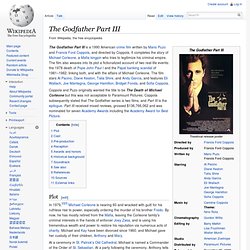
Coppola subsequently stated that The Godfather series is two films, and Part III is the epilogue. Part III received mixed reviews, grossed $136,766,062 and was nominated for seven Academy Awards including the Academy Award for Best Picture. Plot[edit] At a ceremony in St. Patrick's Old Cathedral, Michael is named a Commander of the Order of St. Alfred Hitchcock. Over a career spanning more than half a century, Hitchcock fashioned for himself a distinctive and recognisable directorial style.[6] He pioneered the use of a camera made to move in a way that mimics a person's gaze, forcing viewers to engage in a form of voyeurism.[7] He framed shots to maximise anxiety, fear, or empathy, and used innovative film editing.[7] His stories often feature fugitives on the run from the law alongside "icy blonde" female characters.[8][9] Many of Hitchcock's films have twist endings and thrilling plots featuring depictions of violence, murder, and crime.
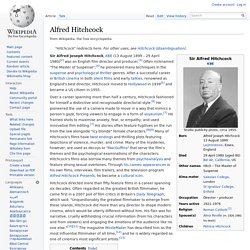
Many of the mysteries, however, are used as decoys or "MacGuffins" that serve the film's themes and the psychological examinations of the characters. Hitchcock's films also borrow many themes from psychoanalysis and feature strong sexual overtones. Psycho (film) The film centers on the encounter between a secretary, Marion Crane (Leigh), who ends up at a secluded motel after embezzling money from her employer, and the motel's disturbed owner-manager, Norman Bates (Perkins), and its aftermath.[2] When originally made, the film was seen as a departure from Hitchcock's previous film North by Northwest, having been filmed on a low budget, with a television crew and in black and white.
Psycho initially received mixed reviews, but outstanding box office returns prompted reconsideration which led to overwhelming critical acclaim and four Academy Award nominations, including Best Supporting Actress for Leigh and Best Director for Hitchcock. In 1992, the US Library of Congress deemed the film "culturally, historically, or aesthetically significant" and selected it for preservation in the National Film Registry. Marion Crane and her boyfriend meet for a secret romantic rendezvous during lunch hour at a hotel in Phoenix, Arizona. James P. The Birds (film) Vertigo (film) The film stars James Stewart as former police detective John "Scottie" Ferguson. Scottie is forced into early retirement because an incident in the line of duty has caused him to develop acrophobia (an extreme fear of heights) and vertigo (a sensation of false, rotational movement).
Scottie is hired by an acquaintance, Gavin Elster, as a private investigator to follow Gavin's wife Madeleine (Kim Novak), who is behaving strangely. Martin Scorsese. Casino (film) Casino is a 1995 American crime drama film directed by Martin Scorsese. It is based on the non-fiction book of the same name by Nicholas Pileggi, who also co-wrote the screenplay for the film with Scorsese. The two previously collaborated on the 1990 hit film Goodfellas. Joe Pesci plays Nicky Santoro, based on real-life Mob enforcer Anthony Spilotro. Nicky is sent to Vegas to make sure that money from the Tangiers is skimmed off the top and that the mobsters in Vegas are kept in line. The Aviator (2004 film) In 1914, nine-year-old Howard Hughes is being bathed by his mother. She warns him of disease, afraid that he will succumb to a flu outbreak: "You are not safe. " By 1927, Hughes (Leonardo DiCaprio) has inherited his family's fortune and is living in California.
He hires Noah Dietrich (John C. Reilly) to run the Hughes Tool Company. Hughes becomes romantically involved with actress Katharine Hepburn (Cate Blanchett). Hughes' greatest passion remains the same: aviation. Three years later, Hughes flies around the world in four days, shattering the previous record by three days. Hepburn and Hughes break up when she announces that she has fallen in love with fellow actor Spencer Tracy (Kevin O'Rourke). Hughes secures contracts with the Army Air Forces for two projects: a spy aircraft and a huge troop transport designed to circumvent the U-boat menace. Goodfellas. The Departed. Raging Bull. Raging Bull is a 1980 American biographical sports drama film directed by Martin Scorsese, produced by Robert Chartoff and Irwin Winkler and adapted by Paul Schrader and Mardik Martin from Jake LaMotta's memoir Raging Bull: My Story.
Gangs of New York. The film begins in 1846 but quickly jumps to 1862. Taxi Driver. Taxi Driver is a 1976 American crime/vigilante film directed by Martin Scorsese and written by Paul Schrader. Shutter Island (film) Shutter Island is a 2010 American psychological thriller film directed by Martin Scorsese. Mean Streets. Mean Streets is a 1973 crime film directed by Martin Scorsese and co-written by Scorsese and Mardik Martin. The film stars Harvey Keitel and Robert De Niro. It was released by Warner Bros. on October 2, 1973. Orson Welles. Early life[edit] Touch of Evil. Citizen Kane. Charlie Chaplin. The Gold Rush. City Lights. Modern Times (film) The Kid (1921 film) The Great Dictator.